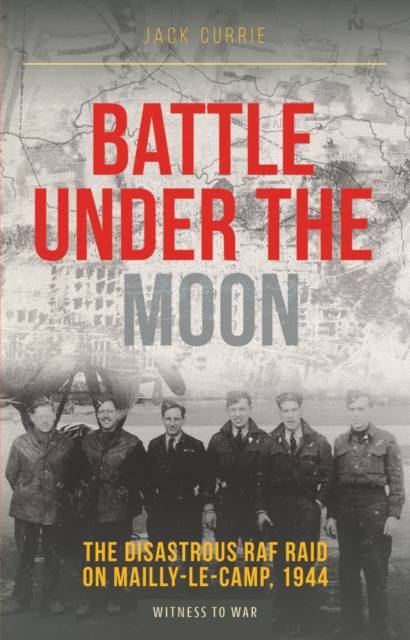
- Afhalen na 1 uur in een winkel met voorraad
- Gratis thuislevering in België vanaf € 30
- Ruim aanbod met 7 miljoen producten
- Afhalen na 1 uur in een winkel met voorraad
- Gratis thuislevering in België vanaf € 30
- Ruim aanbod met 7 miljoen producten
Zoeken
Battle Under the Moon
The Disastrous RAF Raid on Mailly-Le-Camp, 1944
Jack Currie
Paperback | Engels
€ 12,95
+ 25 punten
Omschrijving
This is a gripping account of the ill-fated RAF raid, on 3 May 1944, on the Panzer tank depot and military barracks at Mailly-le-Camp south of Rheims in northern France, part of the softening up process on German military targets, in preparation for the D-Day landings. Raids like this over occupied France were considered relatively low risk affairs and only counted for one third of a mission for the crews concerned.
In total, 362 RAF bombers, Lancasters, Mosquitoes and Halifax, from bases in England took part in a raid and although no-one involved anticipated disaster, forty-two Lancasters never returned home. Almost incredibly, those who planned the attack were apparently unaware that four German night fighter bases were located nearby. Luftwaffe fighters wreaked havoc on the bombers as they circled a marker in bright moonlight awaiting the order to attack their target
This is the story of that battle, bitterly contested and ever-remembered by those who were engaged, one among hundreds that were fought in the skies over Europe between the RAF's bombers and the Luftwaffe's night-fighters in the course of World War Two. It lasted less than sixty minutes but cost two hundred and fifty-five lives.
In total, 362 RAF bombers, Lancasters, Mosquitoes and Halifax, from bases in England took part in a raid and although no-one involved anticipated disaster, forty-two Lancasters never returned home. Almost incredibly, those who planned the attack were apparently unaware that four German night fighter bases were located nearby. Luftwaffe fighters wreaked havoc on the bombers as they circled a marker in bright moonlight awaiting the order to attack their target
This is the story of that battle, bitterly contested and ever-remembered by those who were engaged, one among hundreds that were fought in the skies over Europe between the RAF's bombers and the Luftwaffe's night-fighters in the course of World War Two. It lasted less than sixty minutes but cost two hundred and fifty-five lives.
Specificaties
Betrokkenen
- Auteur(s):
- Uitgeverij:
Inhoud
- Aantal bladzijden:
- 184
- Taal:
- Engels
Eigenschappen
- Productcode (EAN):
- 9781910809808
- Verschijningsdatum:
- 21/02/2022
- Uitvoering:
- Paperback
- Formaat:
- Trade paperback (VS)
- Afmetingen:
- 129 mm x 197 mm
- Gewicht:
- 185 g

Alleen bij Standaard Boekhandel
+ 25 punten op je klantenkaart van Standaard Boekhandel
Beoordelingen
We publiceren alleen reviews die voldoen aan de voorwaarden voor reviews. Bekijk onze voorwaarden voor reviews.











